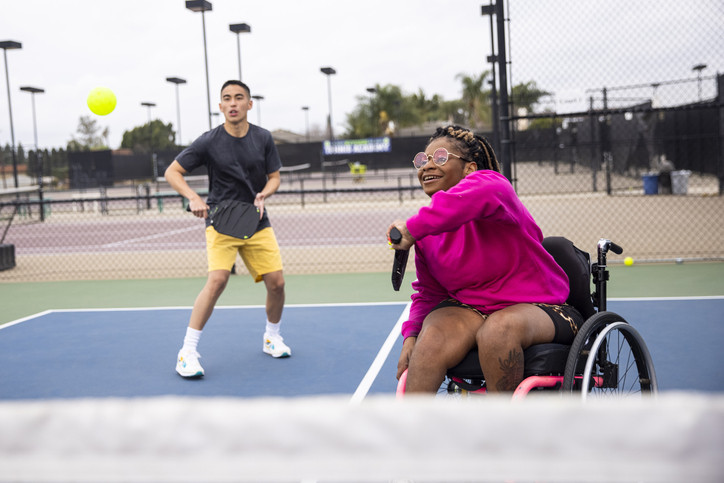
Tips to leverage neuroplasticity to maintain cognitive fitness as you age

Can white noise really help you sleep better?

Celiac disease: Exploring four myths

What is prostatitis and how is it treated?

What is Cushing syndrome?

Exercises to relieve joint pain

Think your child has ADHD? What your pediatrician can do

Foam roller: Could you benefit from this massage tool?

Stepping up activity if winter slowed you down

Common causes of cloudy urine
Independent Living Archive
Articles
Health-savvy house hunting
When people house-hunt in their 50s and 60s, they should consider home features that enable them to age in place if they become less mobile. Such architectural details include fewer or no stairs, bright lighting, an open layout, cabinets that aren't too high, and bathrooms with step-in showers. Outside amenities are also important, including nearby health care facilities, stores, pharmacies, and parks. A vibrant community can expand people's social options and provide proximity to neighbors to call if needed.
3 types of therapists to help you improve daily function
When physical change makes once easy tasks challenging, it may be time to turn to certain therapists for help. A physical therapist can use exercises to help someone improve strength, balance, and mobility. An occupational therapist can teach someone new ways to do daily tasks by adjusting existing techniques or using adaptive equipment. A speech-language pathologist guides a person through exercises that help with difficulties speaking loudly, swallowing, or communicating.
Programs to sharpen your driving skills
Several types of programs can make driving safer for older drivers. A Car-Fit evaluation helps improve the way a driver fits in a vehicle. A driving refresher course helps drivers stay up to date on driving techniques, laws, and vehicle safety technology. A formal driving assessment evaluates a person's physical and mental health and driving ability on the road. Driver rehabilitation provides training for people to use adaptive driving equipment, practice driving in challenging conditions, and develop safe driving habits.
What's the relationship between memory loss and driving?
Alzheimer's disease and other forms of dementia affect all the regions of the brain involved in driving, but whether or not a person should give up driving depends on the severity of the disease and the specific cognitive abilities that are impaired.
Taking up adaptive sports
Our abilities may change during the course of a lifetime. Adaptive sports are competitive or recreational activities that are modified to support people living with disabilities or limitations.
Getting the most from your remaining years
Following healthy habits like exercising, eating a proper diet, and being socially engaged can help people live a longer, healthier life. Still, the ultimate goal is not simply to live longer, but to enjoy life, which means placing more emphasis on quality of life. How life quality is defined can vary depending on people's goals, but it often revolves around three certain mindsets: having a sense of purpose, focusing on where one wants to devote time and energy, and enjoying the process and journey.
A care quarterback for older adults
Geriatricians offer health guidance and treatment to adults 65 and older. The specialty centers on health concerns increasingly common with age, including falls, hearing loss, incontinence, memory problems, and the need to juggle multiple conditions and medications. Among other goals, geriatricians aim to optimize drug dosages and prevent medication overlap or dangerous side effects. They also coordinate each patient's care with other specialists who help manage chronic conditions. Geriatrician visits are typically longer than those with general practitioners.
Hand pain from arthritis? This may help
The joint connecting the thumb and wrist is crucial in everyday activities like opening jars or grasping objects, but if osteoarthritis develops, treatment options are limited and don't always work well. A new study has demonstrated the effectiveness of occupational therapy for arthritis in this joint of the hand.
Millions rely on wheelchairs for mobility, but repair delays are hurting users
Wheelchairs allow millions of Americans with mobility disability to participate in daily activities and engage in community life. But when a wheelchair needs to be repaired, delays can mean a person is unable to leave their home or manage daily tasks for days.
A new angle on aging in place: The virtual village
A virtual village is a group of older adults who live in their own homes, near each other, and agree to help each other. They form a self-governing nonprofit organization and volunteer to provide village services such as transportation, friendly visits, errands, exercise and social events, a dedicated hotline, and referrals to vetted services and suppliers. The village won't replace an assisted living facility or nursing home, but it may help delay the transition.

Tips to leverage neuroplasticity to maintain cognitive fitness as you age

Can white noise really help you sleep better?

Celiac disease: Exploring four myths

What is prostatitis and how is it treated?

What is Cushing syndrome?

Exercises to relieve joint pain

Think your child has ADHD? What your pediatrician can do

Foam roller: Could you benefit from this massage tool?

Stepping up activity if winter slowed you down

Common causes of cloudy urine
Free Healthbeat Signup
Get the latest in health news delivered to your inbox!
Sign Up











